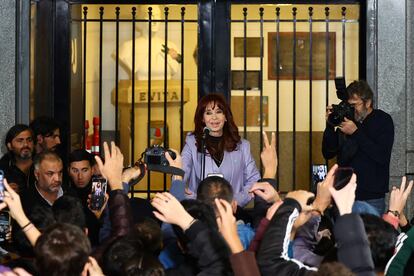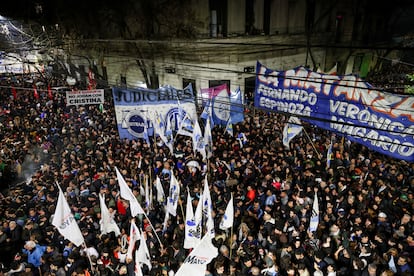Cristina Fernández de Kirchner’s corruption conviction shatters Argentine politics
The former president has been barred for life from running for public office, but she is by no means out of the electoral game

Argentina is entering an unknown political dimension. Cristina Fernández de Kirchner must decide before next Wednesday where she will serve six years of house arrest, a benefit she is entitled to for being over 70 years old. On Tuesday, the Supreme Court rejected all of her defense’s claims and upheld the corruption convictions handed down by two lower courts. Her imprisonment is as relevant as the second part of the ruling: Kirchner was barred for life from running for public office, meaning she will no longer be able to participate in elections. But she is by no means out of politics. The Supreme Court’s ruling has jolted a Peronist movement that had not yet recovered from its defeat against Javier Milei in 2023. It is now in active resistance mode, an epic feat that suits it better than any other.
Kirchner likes to look at herself in the mirror of Luiz Inácio Lula da Silva, imprisoned for 580 days in 2018 and 2019 in a corruption case that was annulled by the Supreme Federal Court in 2021. But also in that of Juan Domingo Perón, exiled and banned for 18 years after his overthrow in 1955. Perón managed Argentine politics in absentia from his retirement in Madrid. Politicians, unionists, social leaders, intellectuals, and anyone who wished to be anointed by the general visited him in Puerta de Hierro in the Spanish capital and returned to Argentina with the good news. It is only to be expected that Kirchner will now have her own Puerta de Hierro, but in the province of Buenos Aires, where her electoral stronghold is located and where the fate of her party in the October legislative elections is at stake.
Kirchner’s imprisonment strengthens her role as the top leader in the internal dispute she maintains with Axel Kicillof, the governor of the province of Buenos Aires, for control of the Peronist party. She is, without the possibility of appeal, a victim “of the judicial party,” as she reiterated once again to the thousands of supporters who surrounded her first at the party headquarters, and then at night outside her home in the Constitución neighborhood, where her daughter lives.
The sentence, she said, is the result of political persecution orchestrated by “the economic powers” that want to control Argentina. She took aim more at the United States than at “that puppet who governs us,” referring to Milei. “What they are preparing is how to dismantle the popular and political organization that will occur, because history shows that beyond proscription, the people end up organizing in self-defense. The people always return,” she warned Monday, when she already assumed the Supreme Court ruling against her was a given.

The conviction in the so-called Vialidad Case dates back to her years as president of Argentina, between 2007 and 2015. The court found her guilty of harming the Argentine state by irregularly awarding 50 public works projects to a businessman friend, Lázaro Báez, in the Patagonian province of Santa Cruz, the birthplace of Kirchnerism. According to the courts, Báez reciprocated “the unduly obtained benefits” through spurious business dealings with “the former president’s family businesses.” With legal avenues closed in Argentina, Kirchner’s only option is to take her case to the Inter-American Court of Human Rights. If the courts fail, there’s always politics.
The conviction had an immediate impact on a party that was divided and, above all, demobilized. Peronist governors who detest Kirchner rallied behind her and repudiated the Supreme Court’s ruling. Kicillof, once her political heir and now her main internal rival, suspended his entire agenda in the province of Buenos Aires to support her. “The effects of this are so profound that one would expect it to have repercussions at every level,” he said, implying that if Peronism intends to stop Milei’s far-right La Libertad Avanza party in October, they have no choice but to unite. Without Kirchner in the candidate draw, Kicillof will try to leverage the weight of his administration in the country’s largest and richest province by assembling the lists of national deputies and senators.
Peronists were excited Tuesday by the unrest the ruling sparked in the streets. Thousands of people, mostly very young, gathered in front of Kirchner’s house in the capital. “Argentinos, the JP is back,” they chanted, using the initials of the Peronist Youth, which many believed had almost disappeared. Occasionally, Kirchner appeared on the balcony and waved. There were also spontaneous demonstrations in the country’s main cities, such as Córdoba, Rosario, and La Plata. It is expected that the occupation of the Faculties of Philosophy and Letters and Social Sciences at the University of Buenos Aires will be replicated at other university campuses.
Kirchner has as many followers as detractors. She is either idolized or deeply hated, but no one doubts that she has been the most influential political figure of the last 20 years. She was a congresswoman, a senator, twice president, and once vice president. Together with her husband, former president Néstor Kirchner, who died in 2010, she began a long period of hegemony in Argentina for “left-wing Peronism,” the opposite of the ultra-liberal Peronism that Carlos Menem had represented in the 1990s. After Mauricio Macri’s interregnum in 2015, Kirchnerism returned to power in 2019, under Alberto Fernández. The president was quick to break with Kirchner, his vice president, and it all ended in disaster. The doors were open for Milei’s far-right, which arrived at the Casa Rosada proclaiming the death of “the caste” first, and then of “the Kukas (Kirchnerists).”

“Justice. The end,” Milei, on tour in Israel, celebrated on social media minutes after the court ruling was announced. And then he got lost in the topic that has recently obsessed him more than anything else: the press. “The Republic is functioning, and all the corrupt journalists, accomplices of lying politicians, have been exposed in their operettas about the supposed pact of impunity,” he wrote. There was little else to say from the Casa Rosada. Chief of Ministers Guillermo Francos, the least vociferous voice in the Cabinet, said it was “a sad moment to see a two-time president, former vice president, and senator sentenced to prison.”
Without Kirchner among the competitors, Milei loses the organizing principle of his electoral strategy. The “us” or “them” argument loses steam and could cost him dearly in October. Although it is still too early to measure its impact, if Peronism feels challenged, it is possible that it will mobilize at the polls and reverse the collapse in turnout recorded in the provincial elections held in recent months. Milei will insist on nationalizing the legislative campaign. He will claim that not only representatives and senators are being elected, but also two models of the country: one “impoverishing statist” and another guided by the “forces of heaven” that will annihilate the state and turn Argentina into a superpower. He will face a Peronism that, perhaps, will find reasons to fight back.
Sign up for our weekly newsletter to get more English-language news coverage from EL PAÍS USA Edition
Tu suscripción se está usando en otro dispositivo
¿Quieres añadir otro usuario a tu suscripción?
Si continúas leyendo en este dispositivo, no se podrá leer en el otro.
FlechaTu suscripción se está usando en otro dispositivo y solo puedes acceder a EL PAÍS desde un dispositivo a la vez.
Si quieres compartir tu cuenta, cambia tu suscripción a la modalidad Premium, así podrás añadir otro usuario. Cada uno accederá con su propia cuenta de email, lo que os permitirá personalizar vuestra experiencia en EL PAÍS.
¿Tienes una suscripción de empresa? Accede aquí para contratar más cuentas.
En el caso de no saber quién está usando tu cuenta, te recomendamos cambiar tu contraseña aquí.
Si decides continuar compartiendo tu cuenta, este mensaje se mostrará en tu dispositivo y en el de la otra persona que está usando tu cuenta de forma indefinida, afectando a tu experiencia de lectura. Puedes consultar aquí los términos y condiciones de la suscripción digital.








































